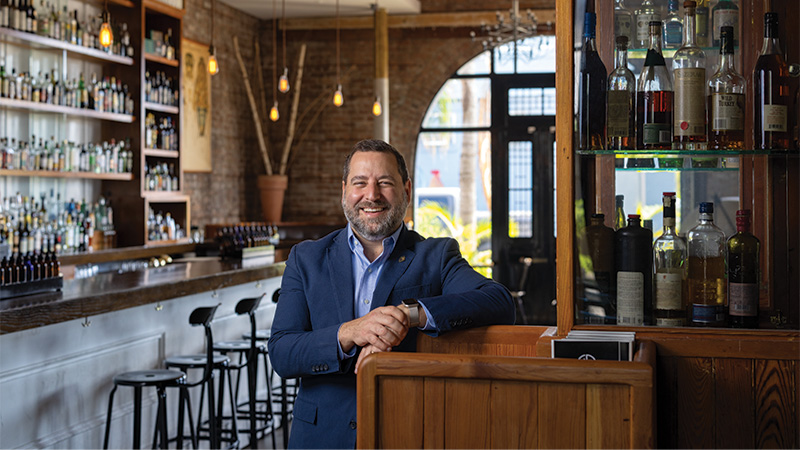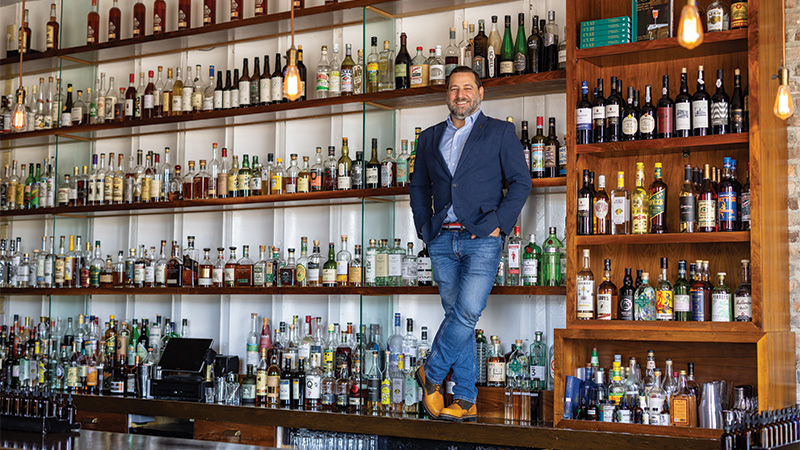This feature is part of our 2023 Next Wave Awards.
A longtime legend in New Orleans cocktail circles, Neal Bodenheimer elevated his status nationally — and beyond — this past year. In late 2022, he released his first cocktail book along with co-writer Emily Timberlake, “Cure: New Orleans Drinks and How to Mix ’Em from the Award-Winning Bar.” This year it was nominated for a James Beard Award and won an IACP Cookbook Award.
“Any time you win an award you end up getting a bunch of people that don’t really know about your bar and don’t know why they’re there, just show up,” Bodenheimer jokes, adding, “It’s a good problem to have, though.”
Bodenheimer is referring to Cure, the bar the book was named after, which he opened all the way back in 2009. His family had been in New Orleans since the 1850s. Even in a drinkin’ town like New Orleans, these were still the nascent days of the cocktail renaissance, and Cure would go on to be recognized as the city’s first standalone modern craft cocktail bar.
“Some tourists thought of New Orleans as a big-ass beer, getting blackout drunk, and eating a Lucky Dog at 4 a.m. on Bourbon Street,” he recalls. “But others knew about the longstanding drinking traditions and wanted to peel back that sugary sweet drinks schtick New Orleans had become known for.”
He recalls those still being the days when many locals were aware and proud of New Orleans’ cocktail traditions, but where finding, say, a good Sazerac was still a bit of a crapshoot.

Perhaps that’s why Bodenheimer had first been swept up by this cocktail revolution, not in New Orleans, but while finding himself in New York in the aughts waiting tables, bartending, and drinking the cocktails of early industry luminaries like Eben Freeman and Audrey Saunders. After Hurricane Katrina struck in 2005, Bodenheimer abruptly changed his life’s plans and decided to return home to make a mark on his own city’s drinking scene.
“It was still a really fertile scene to open a great cocktail bar,” he says. “As much as we revere the past, there was a time after Katrina where New Orleans was really forward-thinking and everyone was still looking around going, ‘Wouldn’t this be a great addition to New Orleans?’”
His first cocktail menu mostly consisted of classics, especially those born in New Orleans, and only one original drink. The mere fact that Cure, the book, has 256 pages of bar originals — countless riffs on slings, flips, fizzes, and so on — tells the story of how Cure, the bar, and, in turn, the city’s drinking habits have evolved. In 2018, Cure won the James Beard Award for Outstanding Bar Program.
More bars would follow for Bodenheimer. There was Cane & Table, a tropical bar focused on rum, which came to the French Quarter in 2013. Vals, an agave-leaning bar and restaurant, opened in a former gas station near Cure in 2020. Bodenheimer opened his latest spot, Peychaud’s, named after Antoine Peychaud, creator of his eponymous bitters, in a building where the man once lived in the French Quarter, in May 2021. There’s also a Cure outpost in Concourse C of the city’s Louis Armstrong International Airport, too.
By now, Bodenheimer isn’t “just” a bar owner, though, he’s a vital part of the fabric of New Orleans, one of the world’s most storied drinking cities. After the original founders of Tales of the Cocktail, the industry’s yearly convention-cum-bacchanalia, were asked to step aside in 2017, Bodenheimer became a partner and co-chair in the endeavor.

“New Orleans has always loved to host people, it’s ingrained in our DNA,” Bodenheimer says. “Looking around, this industry is so much bigger than it was when Tales was founded.”
“Tales grew up with the industry,” he adds. “So it was, really for me, about making sure something so important for my career and community, and the bar industry in general, didn’t go out of business.”
Suddenly, the humble man quietly behind some of the city’s top cocktail destinations had become the public face of the cocktail industry’s biggest world gathering. A remarkable 112 countries logged into online-only events held during the pandemic.
As Bodenheimer says, “Our future is global.”
